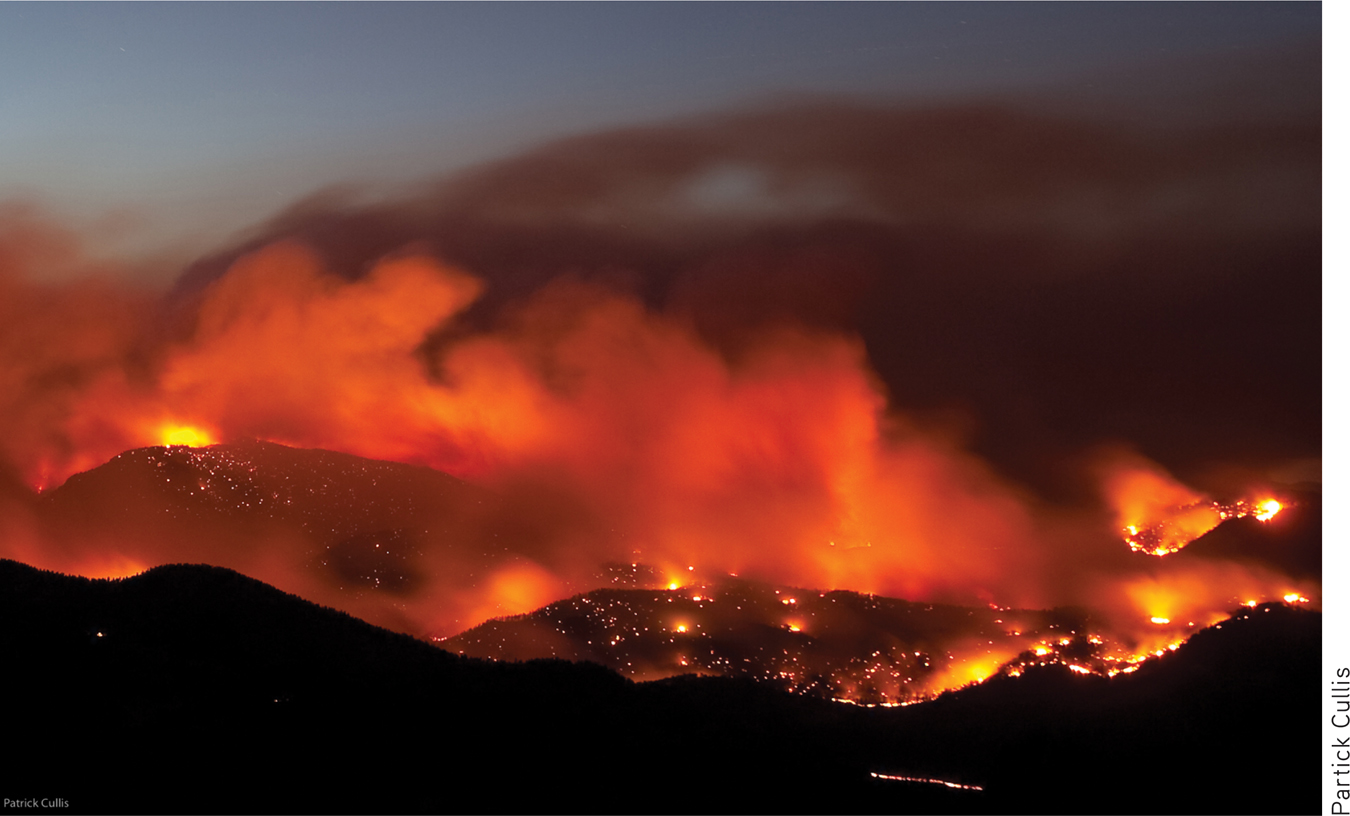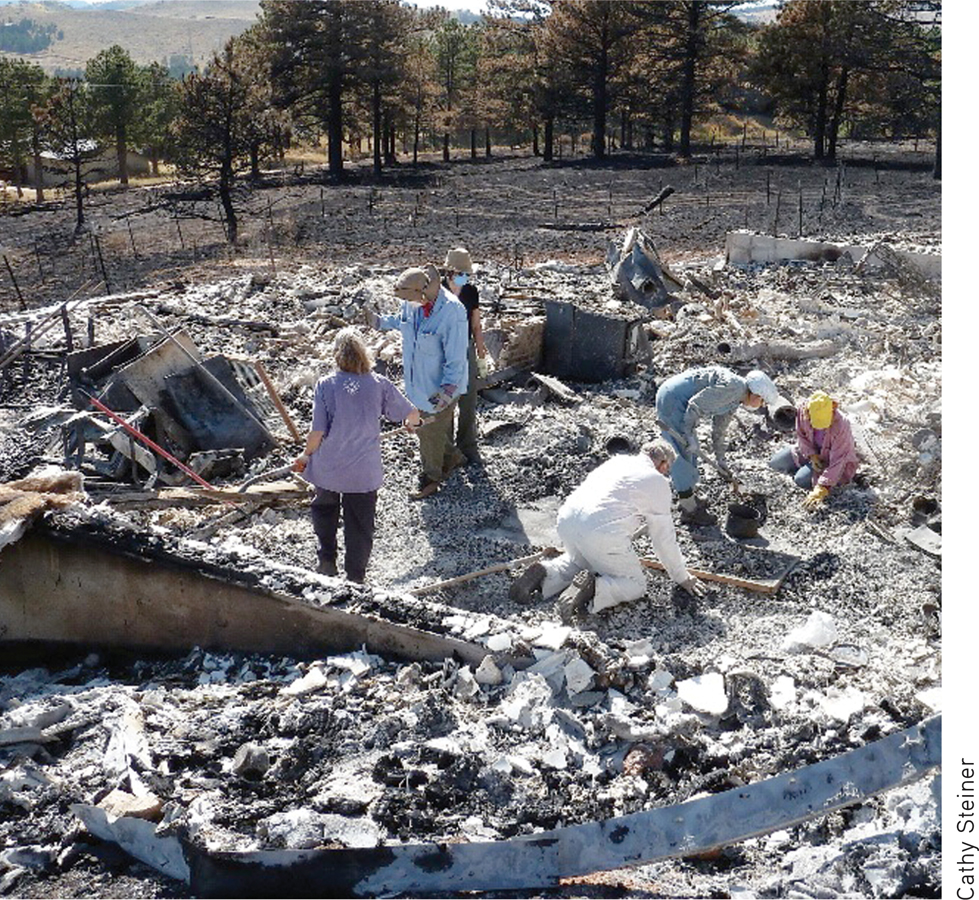Chapter Introduction

MYTH OR SCIENCE?
Is it true …

That most people exposed to severe trauma will develop PTSD or other serious psychological problems?
That all stress is bad for you?
That stress is linked to premature aging?
That pessimists handle stress better because they expect bad things to happen?
That high-achieving people who work long hours are setting themselves up for a heart attack?
That marriage is more beneficial for the health of women than of men?
That the best way to comfort a stressed-out friend or relative is to give them advice and show them that the problem is not as bad as it seems?
13
Stress, Health, and Coping
Masson/Shutterstock
Fire and Ash
PROLOGUE
HAWK WOKE UP, LUNGS AND EYES burning. Her friend’s smoking always bothered her, but this couldn’t just be cigarette smoke.
Pulling on her boots, Hawk went outside. Everything was saturated in a sickly, orange light. The air was filled with smoke, obscuring the sky and burning her throat. What was going on?
Hawk answered her ringing cell phone. “Hawk!” her mother said forcefully. “You need to come home, NOW. There’s a fire over in Fourmile Canyon. We have to evacuate! Get up here right away and pack up whatever stuff you want to take with you.” Hawk’s mind started racing. It was her last summer in the small house high in the pines above Boulder, Colorado, where she had lived her entire life. She had enlisted in the Air Force right after finishing high school and was due to report for boot camp in just a few weeks. Her stomach tightened as she realized that she might not have a home to return to.
Feeling numb, Hawk sped to the edge of town. The road up the mountain was blocked off, and a man wearing a Boulder County sheriff’s uniform stopped her. “This area is closed now,” he barked. “You should have come earlier!” But Hawk hadn’t earned her nickname by being easily cowed. No one even noticed as she drove right up the mountain behind one of the fire department SUVs.
Standing in the doorway to her room, Hawk looked around blankly. She started grabbing items—clothes, sketchpads, her laptop. She panicked when she couldn’t find the little box that held her father’s medals and photos from his Marine service in Vietnam. She grabbed the flag that the Air Force had given her grandmother when her grandfather died.
“Hawk, come on, we need to leave,” her mother called. Taking one last look around her room, Hawk reluctantly ran back down the stairs to her car. Most of their neighbors had already left. Chalk marked the doors to show that the sheriff had checked to make sure that no one was left inside.
Almost 1,500 miles away, Andi had just returned from kayaking along the Washington coast. It was Labor Day, the last day of her vacation before she headed home to Colorado. Late that afternoon, she checked her e-mail.
To: Andi
Subject: Fourmile fire
Hi Andi,
Wanted to let you know of a fire that may be headed toward your house. They are evacuating Fourmile and Sunshine Canyons, and Sugarloaf, too. I know you’re not home so you’re safe but wanted to let you know.
Andrea
Andi called her house. Four rings, and then the answering machine picked up. That meant the power was still on—and her house was still standing.
Meanwhile, back in Colorado, your author Sandy was anxiously monitoring the situation. Although nowhere near the path of the fire, she could see and smell the thick plumes of black smoke that filled the sky. When darkness came, brilliant orange flames flickered all over the distant foothills, punctuated by occasional bursts of light when the fire flared up. Online, there were emergency bulletins, Twitter feeds, and even a Facebook page with posts about the fire, but there was nothing that could tell her whether her friends’ homes had survived the fast-moving flames. No one knew anything other than that the fire was out of control and spreading rapidly.

Thousands of mountain residents had been forced to evacuate, some fleeing flames that reached 200 feet into the air. One man reported that his car bumper had melted in the intense heat as he drove through the fire. State and federal firefighting teams had been called in to help the local volunteer departments.
Andi called home again. This time, her call went straight to voice-mail. “At that moment,” Andi said, “I knew my house was gone.” All she had left was her car, one suitcase of clothes, her laptop, her kayak, and her dog, Nellie.
For days, the hot, dry winds blew, and the wildfires burned out of control. Firefighters fought to contain the fire and protect as many homes as they could. Trees and houses continued to explode. New fires broke out all over the rugged canyons and hills northwest of Boulder. “BOULDER ON EDGE,” the headlines read. An additional 9,000 people were told to prepare to evacuate their homes.
A few hardy souls hiked into the burn area on back-country trails or trained scopes from nearby peaks to see if their homes were still standing. Rumors flew, and the evacuees clamored for information at public meetings. But authorities were too busy fighting the fire to survey areas that were already destroyed.
Five days after the fire began, Hawk was able to return to her home, smoke-damaged but thankfully still standing. Six thousand acres had burned, and 169 homes were completely destroyed. Andi’s house, where she had lived for 20 years, had burned to the ground.
Your author Sandy was one of a small group of friends who accompanied Andi in a caravan up to her land. The long dirt road to her property went through a blackened, barren, almost lunar-looking landscape. Stark against the blue sky and bare dirt were the charred skeletons of what had once been trees.

And Andi’s house? The main floor had completely collapsed into the lower floor, where we could make out the blackened outlines of her toppled wood-stove and dishwasher. Twisted pipes. Chunks of melted glass and metal, pieces of exploded pottery. There was nothing left—nothing but a six-inch-deep pile of rubble and ashes. “Wow,” someone said softly.
Andi sucked in her breath and swallowed hard. She tried to say something cheerful, but it was all she could do to hold back tears. She had steeled herself to expect the worst, but nothing had prepared her for such complete devastation.
Most members of the community breathed a sigh of relief when the fires were finally out, when people could return home, when life could go back to normal. But for the nearly 200 families who had lost their homes, “normal” was just a memory. Where to live? How to begin replacing not just a house or a few lost treasures, but … everything?
It took days for Hawk and her mother to wash the soot off their windows, floors, and walls. But for Andi and the others who had lost their homes in the Colorado fire-storm, the toughest challenges were ahead of them. As we explore the nature of stress and health psychology, we’ll return to their stories. 